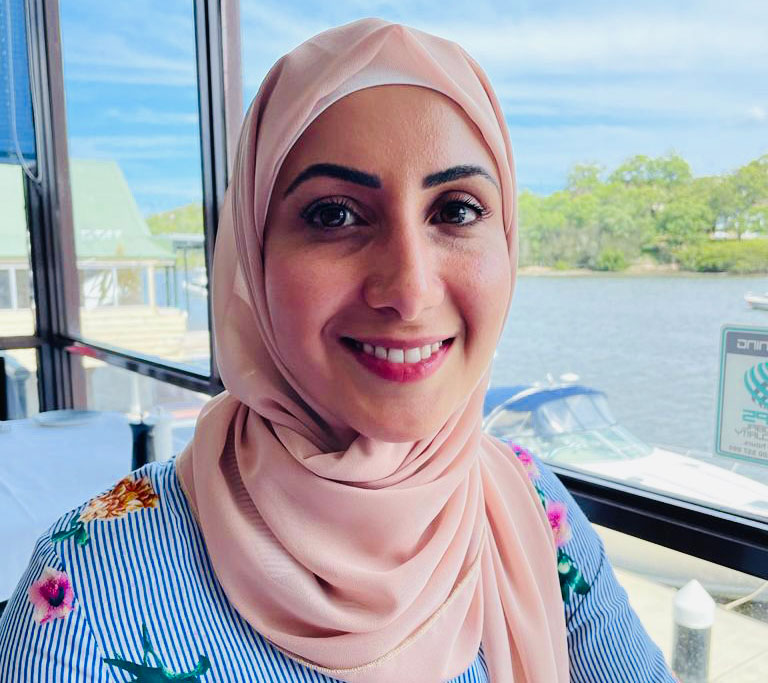2023 UNE Rising Star Award winner - Laila Mandoh
In recognition of her outstanding professionalism and leadership in improving special needs learning
In between parenting four children and working at two busy high schools, special education teacher and UNE 2023 Rising Star Laila Mandoh is crafting a children’s book.
Although fictional, it draws heavily on her real experiences of teaching some of the most disadvantaged of students, including those with severe intellectual and physical disabilities who are wheelchair bound and non-verbal.
In the story, although none of her students can speak, their teacher successfully teaches them how to make up tales of their own, largely through “listening with her eyes”.
“Every person can communicate and every student can learn new skills, regardless of their perceived disabilities or abilities"
“Every person can communicate and every student can learn new skills, regardless of their perceived disabilities or abilities,” Laila said. “As teachers, I advocate for not only ‘looking’ at our students, but actually ‘seeing’ them; to take the whole child into consideration, including their social and emotional wellbeing.”
It’s a strategy that has seen Laila advance quickly as a specialist educator and well-respected colleague. Within a year of graduating from UNE in 2020 with a Master of Education (Special Education) she went from being a classroom English teacher to establishing a pioneering Special Education and Learning Support Faculty at Sydney’s private Al Zahra College and training a team of support staff.
Since then she has supported hundreds of students in their cognitive, social and emotional development – along with their parents, her colleagues and the wider school community. She has also exported research-based teaching programs to Blakehurst High School, which has an even larger cohort of students with disabilities.
Not all have been formerly diagnosed, but that has not stopped Laila from working to understand and address their individual needs through tailored literacy, numeracy and reading interventions.
“If you don’t have a diagnosis, it is very difficult to receive any additional support in a public school,” Laila said. “There are critical points in a student’s schooling when we need to address learning difficulties. A lot of people will go undiagnosed their entire life and never receive disability or learning support because of the associated stigma and lack of awareness. It’s an ongoing battle.
“I have been working really hard to get more kids the support they need at school and at home. I try to remove some of the fears and myths around disability, to normalise it and have people accept it as part of our journey through life.”
Laila was first inspired by students in years 9 and 10 in a “challenging all-boys school” in which she worked. Their behaviour –disengagement, non-attendance, oppositional defiance and even classroom fighting – was, she said, a cry for help.
“I discovered that their literacy was at a year 3 level and I knew these students would suffer all their life unless I did something. The school structures were failing them and there was not enough happening at home, so I began working out how I could cater to their needs.”
At Al Zahra, leadership of the new faculty provided an opportunity to educate fellow teachers and resource them adequately.
“It is critical to know your students and their families really well and to understand what might be lifelong conditions"
“It is critical to know your students and their families really well and to understand what might be lifelong conditions,” Laila said. “I try to highlight every student’s strengths, encourage them to know and value themselves, and to set goals to build their skills. I empower them to work for what they want in life, and to challenge their mindset, regardless of the label they have. It’s also important for parents to understand that that their child is capable of achieving, succeeding and thriving.”
Progress can be slow, but with consistent support students can dramatically change their attitude to learning.
“I had a student with dyslexia recently tell me that after only being on a reading support program for three weeks he could read words he ‘would never have read in a million years’,” Laila said. “His view of what he is capable of has changed and he is proud of himself. It’s life-changing for a lot of kids to receive quality support in school, to learn positive strategies that maintain their dignity.”
Colleagues have praised Laila’s courage, curiosity and perseverance, her innovative strategies, collaborative and inclusive approach, and kindness. She said developing a trusting rapport with students who may have ADHD, autism, dyslexia, mild or moderate intellectual delays or other cognitive challenges has been key.
“Whatever opportunity I have with students – a smile, eye contact or a small conversation – it all matters and these students are the ones who need it the most,” Laila said. “They look to their teachers for consistency and care every day.”
Laila would like to see the kind of learning support she has implemented made available in every school, so every student is able “to get the best from the education system” and be set up for success after school.
“Teaching is one of those professions where you can make a huge difference to the lives of others,” she said. “It sounds cliched, but it’s true. You never forget the teachers who influenced you positively. Teaching is a life force, but only if you are willing to give a part of yourself to your students, and to make them feel as though they are seen and heard.”


